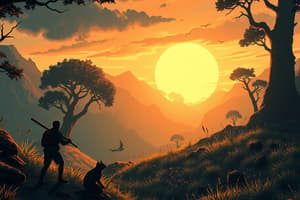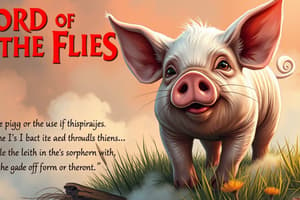Podcast
Questions and Answers
What did he say about the beastie?
What did he say about the beastie?
He says the beastie came in the dark
What was the creature composed of?
What was the creature composed of?
The creature was a party of boys
How did his laughter change?
How did his laughter change?
His laughter became a blood thirsty snarling
What did he imply about identity?
What did he imply about identity?
What was said about the mask?
What was said about the mask?
Describe the shell's appearance.
Describe the shell's appearance.
What was observed about Ralph?
What was observed about Ralph?
What happened to the conch?
What happened to the conch?
How did air affect the colors?
How did air affect the colors?
What was said about Jack's intentions?
What was said about Jack's intentions?
What was the boys' reaction to power?
What was the boys' reaction to power?
What was distinctive about the islands?
What was distinctive about the islands?
How do they refer to their beach?
How do they refer to their beach?
What did the log represent?
What did the log represent?
How is the fire described?
How is the fire described?
What did he forget?
What did he forget?
What was said about Roger's arm?
What was said about Roger's arm?
What was he doing with his spear?
What was he doing with his spear?
Who was referred to as the fair boy?
Who was referred to as the fair boy?
What was notable about his expression?
What was notable about his expression?
What was distinctive about his hair?
What was distinctive about his hair?
What did they express through their actions?
What did they express through their actions?
What did Jack and Ralph share?
What did Jack and Ralph share?
What did he do with his hair?
What did he do with his hair?
What was described about the desire to harm?
What was described about the desire to harm?
What did Ralph weep for?
What did Ralph weep for?
What was said about the accident?
What was said about the accident?
What was true about their nature?
What was true about their nature?
What was the phrase about beating?
What was the phrase about beating?
Who was referred to as the Chief?
Who was referred to as the Chief?
What was said about breaking rules?
What was said about breaking rules?
What did one boy say about the rules?
What did one boy say about the rules?
What did he say about Ralph's group?
What did he say about Ralph's group?
Who is referred to as the true, wise friend?
Who is referred to as the true, wise friend?
What did they experience in relation to power?
What did they experience in relation to power?
What did memory evoke?
What did memory evoke?
Study Notes
Key Quotes and Context from "Lord of the Flies"
- Beast Representation: "He says the beastie came in the dark" highlights the children's fear of the unknown, symbolizing their inner savagery (p. 47).
- Identity of the Beast: "The creature was a party of boys" signifies the transformation of innocence into brutality, as the true monster emerges from within (p. 26).
- Loss of Innocence: "His laughter became a blood thirsty snarling" illustrates how laughter can turn into a manifestation of violence, reflecting the loss of civility (p. 80).
- Inner Darkness: "You knew didn't you? I'm part of you" signifies the inherent evil within humans, suggesting that savagery is a fundamental aspect of human nature (p. 177).
- Mask Symbolism: "The mask was a thing on its own..." indicates the liberation from societal norms when the boys adopt masks, enabling them to act on primitive instincts (p. 80).
- The Conch Shell: "The shell was a deep cream...with a delicate, embossed pattern" represents civilization and order, contrasting the chaos that ensues (p. 22).
- Symbol of Authority: "There was a stillness about Ralph...There was the conch" emphasizes the power of the conch shell as a symbol of democracy and leadership (p. 30).
- Destruction of Order: "The conch exploded into a thousand white fragments and ceased to exist" marks the complete breakdown of civilization on the island (p. 222).
- Nature's Forces: "Air had bleached the yellow and pink to near a white, and transparency" shows the island's transformation and the loss of clarity and innocence (p. 98).
- Conflict Over Leadership: "When I saw Jack I was sure he'd go for the conch" illustrates the struggle for power and authority among the boys (p. 175).
- Power Dynamics: "The boys were falling still and silent, feeling the beginnings of awe at the power set free below them" reflects the attraction to primal instincts and the allure of power (p. 57).
- Geographical Features: "There, where the island petered out in the water, was another island..." describes the isolation and setting of the narrative, suggesting duality of the environment (p. 38).
- Sense of Territory: "What they now thought of as their beach" reinforces their claim to their new territory, highlighting the formation of their society (p. 38).
- Symbol of Leadership: "The log that was his throne" emphasizes Ralph's initial authority and the precarious nature of leadership (p. 185).
- Destructive Forces: "The fire racing forward like a tide" indicates the uncontrollable nature of their actions and consequences of their savagery (p. 245).
- Transformation into Fear: "He forgot his wounds, his hunger and thirst, and became fear" conveys how violence and primal instincts overshadow basic survival needs (p. 245).
- Civilization Decay: "Roger's arm was conditioned by a civilisation that knew nothing of him and was in ruins" symbolizes the breakdown of societal norms and morality (p. 78).
- Hunting Instincts: "Prodding with his spear wherever pigflesh appeared" highlights the boys' regression into primitive hunting behavior (p. 167).
- Character Introductions: "The fair boy" introduces Ralph, setting the stage for his character's journey (p. 12).
- Symbol of Innocence: "There was a mildness about his mouth and eyes that proclaimed no devil" suggests Ralph's innocence and leadership potential (p. 15).
- Character Descriptions: "His hair was red beneath the black cap" denotes Jack's dual nature, embodying savagery and authority (p. 27).
- Joy in Domination: "Eyes shining, mouths open, triumphant, they savoured the right of domination" captures the boys' lust for power and control (p. 39).
- Friendship Development: "Jack and Ralph smiled at each other with a shy liking" reflects the initial camaraderie that degrades over time (p. 31).
- Physical Appearance: "His fair hair was plastered over his eyebrows and he pushed it back" portrays the unkempt nature of the boys as civilization unravels (p. 80).
- Violent Tendencies: "The desire to squeeze and hurt was over-mastering" illustrates the primal instincts that take over the boys (p. 142).
- Reflection on Humanity: "Ralph wept for the...darkness of man's heart" underscores a profound realization of humanity's capacity for evil (p. 248).
- Shift from Accidental Violence: "It was an accident" signifies denial and the boys' attempt to rationalize their actions (p. 227).
- Human Nature: "They were savages it was true, but they were human" acknowledges the complexity of being both civilized and savage (p. 228).
- Mob Mentality: "We'll close in and beat and beat and beat" emphasizes the power of collective violence and mob mentality (p. 114).
- Leadership Title: "The Chief" represents the shift towards authoritarian rule (p. 196).
- Disregard for Rules: "You're breaking the rules" "Who cares?" illustrates the decline of social order and the boys' rebellion against authority (p. 114).
- Rejection of Order: "Bollocks to the rules" reflects the embracing of chaos and savagery (p. 114).
- Defiance: "I'm not going to be a part of Ralph's lot" underscores the division and conflict between factions on the island (p. 158).
- Wise Association: "The true, wise friend called Piggy" loyally represents reason and intellect amidst chaos (p. 248).
- Samneric's Shift: "The otherness of Samneric, felt the power in their own hands" signifies the transformation of followers into participants in savagery (p. 220).
- Shameful Loyalty: "Memory of their new and shameful loyalty came to them" indicates the internal conflict and realization of their loss of morality (p. 230).
Studying That Suits You
Use AI to generate personalized quizzes and flashcards to suit your learning preferences.
Description
Test your knowledge of key quotes from 'Lord of the Flies' with this flashcard quiz. Each card features a notable quote alongside its corresponding page number, helping you to connect the text with its thematic elements. Perfect for studying and reinforcing your understanding of the novel's key insights.




